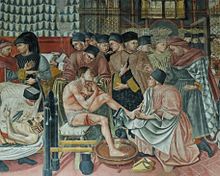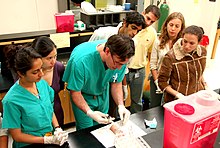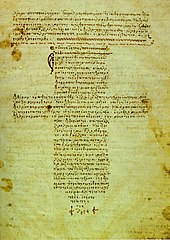Etymology
Clinical practice
- Chief complaint (CC): the reason for the current medical visit. These are the 'symptoms.' They are in the patient's own words and are recorded along with the duration of each one. Also called 'chief concern' or 'presenting complaint'.
- History of present illness (HPI): the chronological order of events of symptoms and further clarification of each symptom. Distinguishable from history of previous illness, often called past medical history (PMH). Medical history comprises HPI and PMH.
- Current activity: occupation, hobbies, what the patient actually does.
- Medications (Rx): what drugs the patient takes including prescribed, over-the-counter, and home remedies, as well as alternative and herbal medicines/herbal remedies. Allergies are also recorded.
- Past medical history (PMH/PMHx): concurrent medical problems, past hospitalizations and operations, injuries, past infectious diseases or vaccinations, history of known allergies.
- Social history (SH): birthplace, residences, marital history, social and economic status, habits (including diet, medications, tobacco, alcohol).
- Family history (FH): listing of diseases in the family that may impact the patient. A family tree is sometimes used.
- Review of systems (ROS) or systems inquiry: a set of additional questions to ask, which may be missed on HPI: a general enquiry (have you noticed any weight loss, change in sleep quality, fevers, lumps and bumps? etc.), followed by questions on the body's main organ systems (heart, lungs, digestive tract, urinary tract, etc.).
- Vital signs including height, weight, body temperature, blood pressure, pulse, respiration rate, and hemoglobin oxygen saturation
- General appearance of the patient and specific indicators of disease (nutritional status, presence of jaundice, pallor or clubbing)
- Skin
- Head, eye, ear, nose, and throat (HEENT)
- Cardiovascular (heart and blood vessels)
- Respiratory (large airways and lungs)
- Abdomen and rectum
- Genitalia (and pregnancy if the patient is or could be pregnant)
- Musculoskeletal (including spine and extremities)
- Neurological (consciousness, awareness, brain, vision, cranial nerves, spinal cord and peripheral nerves)
- Psychiatric (orientation, mental state, evidence of abnormal perception or thought).
Institutions
Branches
- Basic sciences of medicine; this is what every physician is educated in, and some return to in biomedical research
- Medical specialties
- Interdisciplinary fields, where different medical specialties are mixed to function in certain occasions.
Basic sciences
- Anatomy is the study of the physical structure of organisms. In contrast to macroscopic or gross anatomy, cytology and histology are concerned with microscopic structures.
- Biochemistry is the study of the chemistry taking place in living organisms, especially the structure and function of their chemical components.
- Biomechanics is the study of the structure and function of biological systems by means of the methods of Mechanics.
- Biostatistics is the application of statistics to biological fields in the broadest sense. A knowledge of biostatistics is essential in the planning, evaluation, and interpretation of medical research. It is also fundamental to epidemiology and evidence-based medicine.
- Biophysics is an interdisciplinary science that uses the methods of physics and physical chemistry to study biological systems.
- Cytology is the microscopic study of individual cells.
- Embryology is the study of the early development of organisms.
- Endocrinology is the study of hormones and their effect throughout the body of animals.
- Epidemiology is the study of the demographics of disease processes, and includes, but is not limited to, the study of epidemics.
- Genetics is the study of genes, and their role in biological inheritance.
- Histology is the study of the structures of biological tissues by light microscopy, electron microscopy and immunohistochemistry.
- Immunology is the study of the immune system, which includes the innate and adaptive immune system in humans, for example.
- Medical physics is the study of the applications of physics principles in medicine.
- Microbiology is the study of microorganisms, including protozoa, bacteria, fungi, and viruses.
- Molecular biology is the study of molecular underpinnings of the process of replication, transcription and translation of the genetic material.
- Neuroscience includes those disciplines of science that are related to the study of the nervous system. A main focus of neuroscience is the biology and physiology of the human brain and spinal cord. Some related clinical specialties include neurology, neurosurgery and psychiatry.
- Nutrition science (theoretical focus) and dietetics (practical focus) is the study of the relationship of food and drink to health and disease, especially in determining an optimal diet. Medical nutrition therapy is done by dietitians and is prescribed for diabetes, cardiovascular diseases, weight and eating disorders, allergies, malnutrition, and neoplastic diseases.
- Pathology as a science is the study of disease—the causes, course, progression and resolution thereof.
- Pharmacology is the study of drugs and their actions.
- Photobiology is the study of the interactions between non-ionizing radiation and living organisms.
- Physiology is the study of the normal functioning of the body and the underlying regulatory mechanisms.
- Radiobiology is the study of the interactions between ionizing radiation and living organisms.
- Toxicology is the study of hazardous effects of drugs and poisons.
Specialties
Surgical specialty
Internal specialty
Diagnostic specialties
- Clinical laboratory sciences are the clinical diagnostic services that apply laboratory techniques to diagnosis and management of patients. In the United States, these services are supervised by a pathologist. The personnel that work in these medical laboratory departments are technically trained staff who do not hold medical degrees, but who usually hold an undergraduate medical technology degree, who actually perform the tests, assays, and procedures needed for providing the specific services. Subspecialties include transfusion medicine, cellular pathology, clinical chemistry, hematology, clinical microbiology and clinical immunology.
- Pathology as a medical specialty is the branch of medicine that deals with the study of diseases and the morphologic, physiologic changes produced by them. As a diagnostic specialty, pathology can be considered the basis of modern scientific medical knowledge and plays a large role in evidence-based medicine. Many modern molecular tests such as flow cytometry, polymerase chain reaction (PCR), immunohistochemistry, cytogenetics, gene rearrangements studies and fluorescent in situ hybridization (FISH) fall within the territory of pathology.
- Diagnostic radiology is concerned with imaging of the body, e.g. by x-rays, x-ray computed tomography, ultrasonography, and nuclear magnetic resonancetomography. Interventional radiologists can access areas in the body under imaging for an intervention or diagnostic sampling.
- Nuclear medicine is concerned with studying human organ systems by administering radiolabelled substances (radiopharmaceuticals) to the body, which can then be imaged outside the body by a gamma camera or a PET scanner. Each radiopharmaceutical consists of two parts: a tracer that is specific for the function under study (e.g., neurotransmitter pathway, metabolic pathway, blood flow, or other), and a radionuclide (usually either a gamma-emitter or a positron emitter). There is a degree of overlap between nuclear medicine and radiology, as evidenced by the emergence of combined devices such as the PET/CT scanner.
- Clinical neurophysiology is concerned with testing the physiology or function of the central and peripheral aspects of the nervous system. These kinds of tests can be divided into recordings of: (1) spontaneous or continuously running electrical activity, or (2) stimulus evoked responses. Subspecialties include electroencephalography, electromyography, evoked potential, nerve conduction studyand polysomnography. Sometimes these tests are performed by techs without a medical degree, but the interpretation of these tests is done by a medical professional.
Other major specialties
- Anesthesiology (also known as anaesthetics): concerned with the perioperative management of the surgical patient. The anesthesiologist's role during surgery is to prevent derangement in the vital organs' (i.e. brain, heart, kidneys) functions and postoperative pain. Outside of the operating room, the anesthesiology physician also serves the same function in the labor and delivery ward, and some are specialized in critical medicine.
- Dermatology is concerned with the skin and its diseases. In the UK, dermatology is a subspecialty of general medicine.
- Emergency medicine is concerned with the diagnosis and treatment of acute or life-threatening conditions, including trauma, surgical, medical, pediatric, and psychiatric emergencies.
- Family medicine, family practice, general practice or primary care is, in many countries, the first port-of-call for patients with non-emergency medical problems. Family physicians often provide services across a broad range of settings including office based practices, emergency department coverage, inpatient care, and nursing home care.
- Obstetrics and gynecology (often abbreviated as OB/GYN (American English) or Obs & Gynae (British English)) are concerned respectively with childbirth and the female reproductive and associated organs. Reproductive medicine and fertility medicine are generally practiced by gynecological specialists.
- Medical genetics is concerned with the diagnosis and management of hereditary disorders.
- Neurology is concerned with diseases of the nervous system. In the UK, neurology is a subspecialty of general medicine.
- Ophthalmology is exclusively concerned with the eye and ocular adnexa, combining conservative and surgical therapy.
- Pediatrics (AE) or paediatrics (BE) is devoted to the care of infants, children, and adolescents. Like internal medicine, there are many pediatric subspecialties for specific age ranges, organ systems, disease classes, and sites of care delivery.
- Pharmaceutical medicine is the medical scientific discipline concerned with the discovery, development, evaluation, registration, monitoring and medical aspects of marketing of medicines for the benefit of patients and public health.
- Physical medicine and rehabilitation (or physiatry) is concerned with functional improvement after injury, illness, or congenital disorders.
- Podiatric medicine is the study of, diagnosis, and medical & surgical treatment of disorders of the foot, ankle, lower limb, hip and lower back.
- Psychiatry is the branch of medicine concerned with the bio-psycho-social study of the etiology, diagnosis, treatment and prevention of cognitive, perceptual, emotional and behavioral disorders. Related non-medical fields include psychotherapyand clinical psychology.
- Preventive medicine is the branch of medicine concerned with preventing disease.
Interdisciplinary fields
- Aerospace medicine deals with medical problems related to flying and space travel.
- Addiction medicine deals with the treatment of addiction.
- Medical ethics deals with ethical and moralprinciples that apply values and judgments to the practice of medicine.
- Biomedical Engineering is a field dealing with the application of engineeringprinciples to medical practice.
- Clinical pharmacology is concerned with how systems of therapeutics interact with patients.
- Conservation medicine studies the relationship between human and animal health, and environmental conditions. Also known as ecological medicine, environmental medicine, or medical geology.
- Disaster medicine deals with medical aspects of emergency preparedness, disaster mitigation and management.
- Diving medicine (or hyperbaric medicine) is the prevention and treatment of diving-related problems.
- Evolutionary medicine is a perspective on medicine derived through applying evolutionary theory.
- Forensic medicine deals with medical questions in legal context, such as determination of the time and cause of death, type of weapon used to inflict trauma, reconstruction of the facial features using remains of deceased (skull) thus aiding identification.
- Gender-based medicine studies the biological and physiological differences between the human sexes and how that affects differences in disease.
- Hospice and Palliative Medicine is a relatively modern branch of clinical medicine that deals with pain and symptom relief and emotional support in patients with terminal illnesses including cancer and heart failure.
- Hospital medicine is the general medical care of hospitalized patients. Physicians whose primary professional focus is hospital medicine are called hospitalists in the United States and Canada. The term Most Responsible Physician (MRP) or attending physician is also used interchangeably to describe this role.
- Laser medicine involves the use of lasers in the diagnostics or treatment of various conditions.
- Medical humanities includes the humanities(literature, philosophy, ethics, history and religion), social science (anthropology, cultural studies, psychology, sociology), and the arts (literature, theater, film, and visual arts) and their application to medical education and practice.
- Health informatics is a relatively recent field that deal with the application of computers and information technology to medicine.
- Nosology is the classification of diseases for various purposes.
- Nosokinetics is the science/subject of measuring and modelling the process of care in health and social care systems.
- Occupational medicine is the provision of health advice to organizations and individuals to ensure that the highest standards of health and safety at work can be achieved and maintained.
- Pain management (also called pain medicine, or algiatry) is the medical discipline concerned with the relief of pain.
- Pharmacogenomics is a form of individualized medicine.
- Podiatric medicine is the study of, diagnosis, and medical treatment of disorders of the foot, ankle, lower limb, hip and lower back.
- Sexual medicine is concerned with diagnosing, assessing and treating all disorders related to sexuality.
- Sports medicine deals with the treatment and prevention and rehabilitation of sports/exercise injuries such as muscle spasms, muscle tears, injuries to ligaments (ligament tears or ruptures) and their repair in athletes, amateur and professional.
- Therapeutics is the field, more commonly referenced in earlier periods of history, of the various remedies that can be used to treat disease and promote health.[24]
- Travel medicine or emporiatrics deals with health problems of international travelers or travelers across highly different environments.
- Tropical medicine deals with the prevention and treatment of tropical diseases. It is studied separately in temperate climates where those diseases are quite unfamiliar to medical practitioners and their local clinical needs.
- Urgent care focuses on delivery of unscheduled, walk-in care outside of the hospital emergency department for injuries and illnesses that are not severe enough to require care in an emergency department. In some jurisdictions this function is combined with the emergency department.
- Veterinary medicine; veterinarians apply similar techniques as physicians to the care of animals.
- Wilderness medicine entails the practice of medicine in the wild, where conventional medical facilities may not be available.
- Many other health science fields, e.g. dietetics
Education and legal controls
Medical ethics
- autonomy – the patient has the right to refuse or choose their treatment. (Voluntas aegroti suprema lex.)
- beneficence – a practitioner should act in the best interest of the patient. (Salus aegroti suprema lex.)
- justice – concerns the distribution of scarce health resources, and the decision of who gets what treatment (fairness and equality).
- non-maleficence – "first, do no harm" (primum non-nocere).
- respect for persons – the patient (and the person treating the patient) have the right to be treated with dignity.
- truthfulness and honesty – the concept of informed consent has increased in importance since the historical events of the Doctors' Trial of the Nuremberg trials, Tuskegee syphilis experiment, and others.








Comments
Post a Comment
Here all information related to medical and doctoral health is published. Visit any of these languages in your language to see your language.